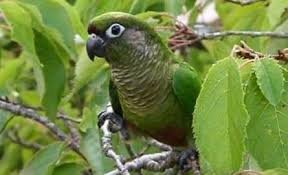Business
The Playful World of Cheeked Conures and Caique Birds
When it comes to vibrant and playful pet birds, two species that stand out are the cheeked conure and the caique. Both birds have unique characteristics and endearing personalities that make them popular among avian enthusiasts. In this blog, we will explore the fascinating traits, care requirements, and social behaviors of these delightful birds, helping you decide which might be the right companion for you.
Understanding Cheeked Conures
Cheeked conures, specifically the Pyrrhura genus, are small to medium-sized parrots native to South America. They are known for their striking plumage, playful nature, and affectionate demeanor. The most common species in the cheeked conure category include the green-cheeked conure and the maroon-bellied conure.
Physical Characteristics
Cheeked conures typically range from 10 to 12 inches in length. Their coloration can vary widely, featuring shades of green, yellow, and blue. Here are some distinctive traits:
- Green-Cheeked Conure: Known for its vibrant green body, the green-cheeked conure has a distinctive maroon undertone on its belly, along with a beautiful blue patch on its wings.
- Maroon-Bellied Conure: This species has a darker green body with a maroon belly and a striking blue-green sheen on its wings.
Personality and Temperament
Cheeked conures are known for their friendly and playful disposition. They are highly social birds that thrive on interaction, both with their human families and other birds. Here are some key personality traits:
- Affectionate: These birds form strong bonds with their owners and enjoy cuddling and being held.
- Playful: Cheeked conures are natural entertainers. They love to play with toys, explore their surroundings, and engage in interactive play with their owners.
- Curious: Their inquisitive nature means they will explore every nook and cranny of their environment, making supervision essential.
Care Requirements for Cheeked Conures
Providing proper care for a cheeked conure involves understanding their specific needs. Here are essential aspects to consider:
Diet
A balanced diet is crucial for the health of your cheeked conure. Their diet should consist of:
- High-Quality Pellets: These should make up about 60% of their diet.
- Fresh Fruits and Vegetables: Offer a variety of safe options like apples, carrots, and leafy greens.
- Nuts and Seeds: These can be given as occasional treats, but be mindful of the quantity to prevent obesity.
Housing
A spacious cage is necessary to allow your cheeked conure to move freely. Consider the following:
- Cage Size: The minimum recommended size is 24 x 24 x 36 inches, providing ample space for movement and play.
- Perches and Toys: Include various perches and toys to keep them entertained and encourage exercise.
Social Interaction
Socialization is vital for cheeked conures. They thrive on human interaction and require daily bonding time. Engaging them in activities such as training sessions and out-of-cage playtime is essential for their mental health.
Introducing Caique Birds
Caiques, belonging to the Pionites genus, are another group of lively and playful parrots native to the rainforests of South America. Known for their distinctive coloration and energetic personalities, caiques are often referred to as the “clowns” of the parrot world.
Physical Characteristics
Caiques typically measure around 9 to 10 inches in length. They are known for their striking coloration:
- Black-Capped Caique: This species features a black crown and bright yellow-orange belly, creating a stunning contrast.
- White-Bellied Caique: Known for its white belly and vibrant green body, this caique is equally eye-catching.
Personality and Temperament
Caiques are known for their exuberant and lively nature. Here are some defining traits:
- Playful: Caiques are highly energetic birds that love to play. They enjoy interactive toys and games with their owners.
- Social: They thrive on companionship and can become very attached to their human families.
- Vocal: Caiques are known for their loud and cheerful vocalizations, making them entertaining but sometimes noisy companions.
Care Requirements for Caique Birds
Like cheeked conures, caiques require specific care to ensure their health and happiness. Here are key considerations:
Diet
A balanced diet is crucial for caiques, and their nutritional needs are similar to those of cheeked conures:
- Pellets: High-quality pellets should form the foundation of their diet.
- Fruits and Vegetables: Fresh options like bananas, leafy greens, and carrots should be included daily.
- Nuts: Offer nuts in moderation as treats.
Housing
Creating an appropriate environment for a caique is essential for its well-being:
- Cage Size: A spacious cage is crucial, with a minimum size of 24 x 24 x 36 inches.
- Toys and Perches: Provide a variety of toys to keep them engaged, as well as perches of different textures.
Social Interaction
Caiques are social birds that require regular interaction. Spend quality time each day engaging with your caique through play and training.
Similarities Between Cheeked Conures and Caique Birds
While cheeked conures and caiques have distinct characteristics, they also share several similarities:
- Social Nature: Both species thrive on interaction and bonding with their owners. They require daily socialization to remain happy and healthy.
- Playfulness: Both cheeked conures and caiques are known for their playful behaviors. They enjoy toys and activities that challenge their intelligence and keep them entertained.
- Vocalization: While caiques are often louder, both species can be vocal. Their chirps and calls add to the lively atmosphere they create in a home.
- Lifespan: Both cheeked conures and caiques have similar lifespans, typically living 20 to 30 years with proper care.
Training Your Cheeked Conure and Caique
Training is essential for both cheeked conures and caiques. It not only helps establish good behavior but also strengthens the bond between you and your bird. Here are some training tips:
Start Early
Begin training when your bird is young. Young birds are usually more receptive to learning and adapting to new routines.
Use Positive Reinforcement
Utilize treats and praise to reward your bird for desired behaviors. This encourages them to repeat those actions.
Keep Sessions Short
Birds have short attention spans, so keep training sessions brief, around 5-10 minutes. Frequent short sessions are often more effective than longer ones.
Be Patient
Training takes time and patience. Celebrate small successes and avoid frustration. Every bird learns at its own pace.
Common Health Issues
Both cheeked conures and caiques can be prone to certain health issues. Being aware of these can help in providing better care:
Obesity
Due to their playful nature, both species need regular exercise. Monitor their diet and encourage playtime to prevent obesity.
Feather Plucking
This behavior can indicate stress or boredom. Providing ample mental stimulation and social interaction can help mitigate this issue.
Respiratory Issues
Birds are sensitive to environmental factors. Ensure proper ventilation and avoid exposure to smoke or fumes to maintain their respiratory health.
Choosing Between Cheeked Conures and Caique Birds
When considering which bird might be the best fit for your home, think about the following factors:
- Space: Both birds require spacious cages and plenty of out-of-cage time. Ensure you have enough space for the bird and their toys.
- Noise Level: Caiques tend to be louder than cheeked conures. If noise is a concern, you may want to consider the vocal tendencies of each species.
- Interaction Needs: Both birds thrive on social interaction, but caiques may require more vigorous play due to their high energy levels. Consider your lifestyle and how much time you can dedicate to interaction.
- Personality Fit: Think about the type of personality that best fits your household. Cheeked conures may be more laid-back, while caiques are more energetic and playful.
Conclusion
Both cheeked conures and caiques are delightful companions that bring joy and vibrancy to any home. Their playful nature, social behaviors, and affectionate personalities make them wonderful pets for those willing to invest time and care.
Understanding their unique characteristics, care requirements, and training needs is essential for fostering a happy and healthy relationship with your feathered friend. Whether you choose a cheeked conure or a caique, you’re sure to enjoy the companionship and lively spirit these birds offer.
In the end, the choice between a cheeked conure and a caique comes down to personal preference and lifestyle. Embrace the adventure of bird ownership, and enjoy the countless moments of joy and connection that come with it!





















